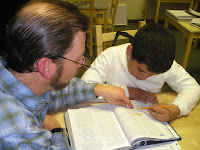When preparing students for the ISEE or SSAT exams, there is more pressure
than ever. Most private and independent schools require that students
take one of these exams, which are similar to college entrance exams in
that they play a key role in admission and are highly challenging.
Admissions officers say that they prefer students not to prepare for these tests,
because they want students to accurately portray their skill set when
they apply to schools. But since the schools are getting more and more
competitive, in order to gain admission, parents feel like they have no
other choice. Moreover, the same admissions officers who say that they
do not want students to prep admit that there is a test score cut-off
required for admission. As such, preparing students for these private
school admission tests is incredibly important and should not be put
off.
I
recommend starting test prep as early as possible, because there is so
much material to cover and so many test-taking strategies to acquire.
For one, there are thousands of vocabulary words that the student ought
to learn, because the verbal section of the tests is incredibly
demanding. Without advanced vocabulary, students typically receive
scores only within the 10th to 25th percentile. There are prefixes and
roots to learn as well, and this takes time. When students cram
last-minute, they are not able to acquire very much new vocabulary at
all, and it's hard to see much score improvement.
Besides vocabulary, the math is incredibly challenging. When I work with young
students in fifth and sixth grade, this is the place where they struggle
the most, because they are being asked to learn completely new content
in order to perform well on this test. I've had to introduce, from
scratch, the concepts of algebra, statistics, probability, and
high-level problems on percentages, ratios, and geometry. The content on
this test is not the content that students are used to learning in
school. It is often many grades above their current level, and it takes
time to acquire so much new material.
Fortunately, my students learn so many new skills that they often end up far ahead
of their math class in school, and a lot of students have ended up being
moved into advanced levels because they are so far ahead now. I always
tell them that they don't have to worry about learning algebra again
many years later, because they are already experts.
Most importantly, it takes time to learn the test-taking strategies. The
ISEE does not take off points for wrong answers, so you never want to
leave a problem blank. However, you don't want to actually spend time
focusing your energy on every single problem, because unlike tests at
school, this test is not designed so that you can actually finish it in
time. You are expected to perform the best you can, knowing that you
have less than one minute to answer each question.
Test preparation allows students to learn which problems they should focus
the most energy on and which ones to just glance at, because it's not
possible to actually attempt to solve every problem on the test.
The SSAT does take a quarter of a point off for every wrong answer, so the
strategy in this case is to know which problems to leave blank, so that
you don't lose many points by attempting problems you shouldn't. This
also gives you more time to focus on the problems that you should be
solving. I always say that is much better to answer less problems, and
get all those problems correct, than rushing through and trying to
answer every single problem, making careless mistakes along the way and
inevitably getting a much lower score as a result.
In my experience, students are able to perform very well on this test once
they have enough preparation. They can learn vocabulary, prefixes and
roots, reading comprehension skills, essay writing skills, and a massive
amount of new mathematical knowledge. They can acquire test-taking
strategies that will give them the confidence to plow through the test
with focus. It all takes time, and work, but in the end, not only does
it gain you entrance to the top private and independent schools, but it
teaches you skills and knowledge that you will be able to use for the
rest of your education.



